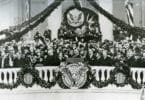James Monroe was born on April 28, 1758, in Westmoreland County, Virginia, into a family of modest means. His early life on a small plantation laid the groundwork for his robust sense of duty and resilience. Monroe was thrust into the hardships of the Revolutionary War as a young man, where he bravely fought at the Battle of Trenton, an experience that left a profound imprint on his character and future in politics.
After the war, Monroe studied law under the mentorship of Thomas Jefferson, which solidified a lifelong friendship and political alliance. His political career advanced rapidly; he served in the Continental Congress, became a Senator, and was appointed as the Minister to France and later to Britain, roles that helped shape his diplomatic skills.
Monroe’s presidency, which began in 1817, was marked by the “Era of Good Feelings,” a period characterized by a sense of national purpose and a desire for unity among the American people following the end of the War of 1812. During his administration, Monroe focused on strengthening the nation’s defenses and infrastructure, which included fortifying the U.S. military and advocating for the construction of canals and roads to foster trade and mobility.
The hallmark of Monroe’s presidency was undoubtedly the Monroe Doctrine, proclaimed in 1823. This significant policy declared that the Americas should be free from future European colonization and free from European interference in sovereign countries’ affairs. It was a bold assertion of U.S. foreign policy that would shape international relations for generations.
Monroe’s domestic policies also had a lasting impact. His support for the Missouri Compromise in 1820, which admitted Missouri as a slave state and Maine as a free state, attempted to balance the power between North and South. While this act temporarily quelled the growing tensions over slavery, it also set the stage for more intense sectional conflicts in the years to come.
On a personal note, Monroe’s life was filled with both triumphs and trials. He married Elizabeth Kortright in 1786, and together they had three children. Elizabeth played a vital role in the social aspects of his presidency, helping to host numerous events that aimed to ease partisan tensions during her husband’s administration.
Monroe’s post-presidency years were spent in quiet retirement at his Virginia estate, Highland, where he continued to engage with political discourse until his death on July 4, 1831. His passing marked the end of an era, as he was the last president who was a contemporary of the Revolutionary War.
Reflecting on Monroe’s presidency, we see a leader who navigated the complexities of early American politics with a vision that extended beyond his time in office. His efforts to secure America’s borders, enforce its policies, and unify its people are enduring aspects of his legacy.
As we continue our exploration of the presidents who shaped the nation, Monroe’s life reminds us of the importance of resilience and vision in leadership. What aspects of Monroe’s presidency do you think are most relevant in today’s political climate?
Stay tuned as our series, “Pillars of Power: The Presidential Chronicles,” unfolds the narratives of those who have led the nation, revealing the challenges and achievements that have defined American history.
Here are five great books that provide in-depth insights into the life and presidency of James Monroe:
“James Monroe: A Life” by Tim McGrath – This biography offers a comprehensive look at Monroe’s multifaceted roles as a soldier, diplomat, and president, providing a vivid portrait of his significant impact on the early Republic.
“The Last Founding Father: James Monroe and a Nation’s Call to Greatness” by Harlow Giles Unger – Unger’s compelling biography highlights Monroe’s transformation of a fragile nation into a powerful empire, showcasing his leadership and vision.
“James Monroe: The American Presidents Series: The 5th President, 1817-1825” by Gary Hart – Part of the American Presidents Series, this book provides a concise yet insightful look into Monroe’s presidency and his role in shaping American national security policies.
“James Monroe: A Life From Beginning to End” (Biographies of US Presidents) by Hourly History – This book offers a quick yet detailed exploration of Monroe’s entire life, making it accessible for readers who want a faster-paced narrative.
“The Presidency of James Monroe” by Noble Cunningham – This study provides rich insights into Monroe’s presidency, offering new interpretations and detailed analyses of his leadership during a critical period in American history.






